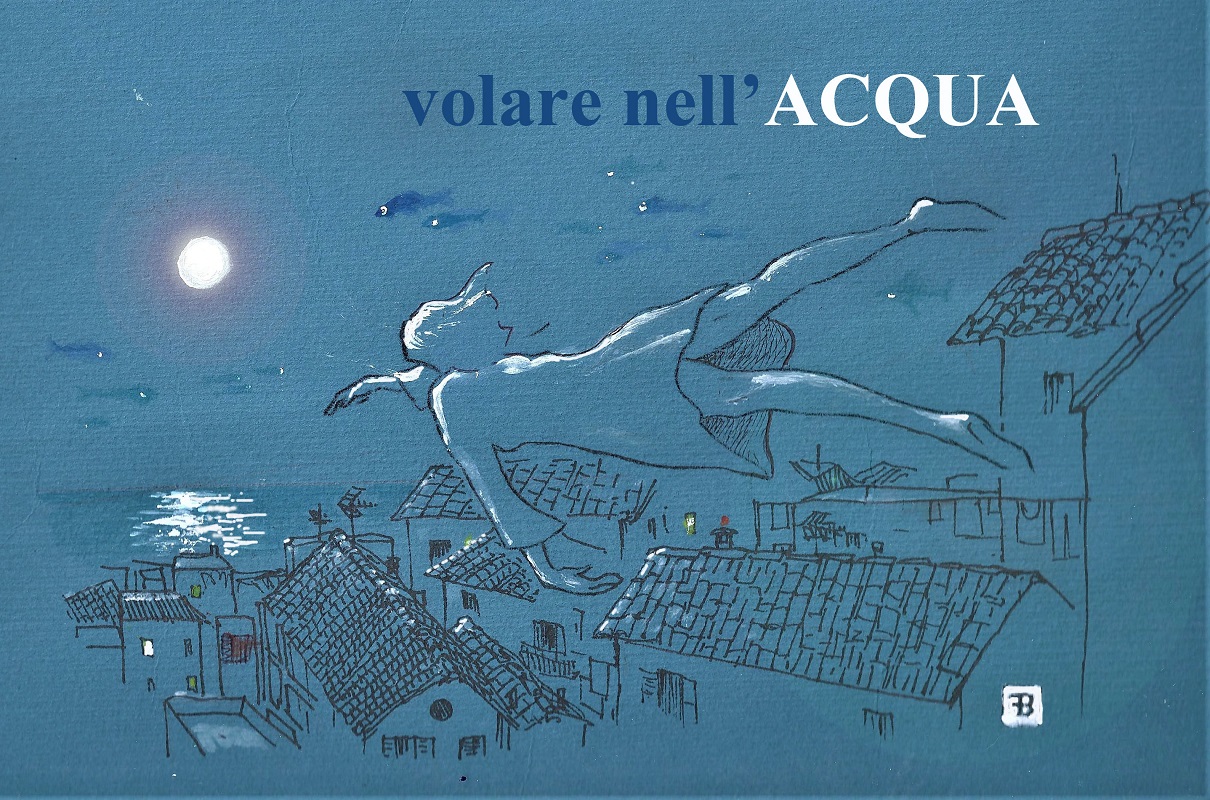Born by the sea, she lived in a fisherman’s shack with her parents and a number of brothers and sisters, and by the sea she remained.
During the day, she went down to the beach and sat with her feet in the water. The sand ran between her toes and she picked up smooth stones and shells which had not been completely worn away by the elements. She threaded those which had a hole in them into long necklaces and she fashioned ear rings out of fish bones. Her hair was bleached by the salty air and her skin was darkened by the sun.
At night, she went out again and lowered herself into the pitch-black water. She swam out to sea until the lights of the village were no more than shimmering points of light like stars fallen on the shore. She allowed herself to sink below the surface to listen to the humming and whispering of the sea and, when the moon was up, to watch the glittering of the fish which brushed against her as if to kiss her. She returned home at dawn before the fishermen launched their boats. She turned to bid farewell to the shining water and she slipped into the house where nobody seemed to notice her absence. She contrived to sit at the window in such a way as to be able to see the stretch of water which changed colour depending on the time of day and the season.
In the house, there was a constant coming and going of men and boys who boarded the boats or came back ashore. The women and girls prepared the fish for sale or gutted them ready for cooking. She was redundant, maybe even invisible, so that when her father called her to the kitchen, she didn’t think that she should go to him but carried on amusing herself with her pebbles, her gaze fixed on the sea. Her father raised his voice, unusual for him, and she tore herself away from her game.
“You have to find yourself a husband.”
He repeats his command but she still doesn’t grasp what he is saying.
“There are too many of us in this house. There’s not enough work for everybody and anyway, you don’t ever seem to do anything. You can learn to be of use to your own family. I’m thinking of marrying you to that foreigner who’s taken the house at the top of the village.”
The “foreigner” comes from another village not far off but, because of his enormous size and his red hair, he is regarded with suspicion and treated with the contempt reserved for those who don’t fit in. All the other people in the village are short and skinny with fair hair. She is tiny like a child. The gigantic man needs someone to take care of the house and to go shopping for him.
She could never say no. She’d never learnt how to. They get married.
From her husband’s house the sea can only be seen from the roof. She shins up the dormer and perches on the ridge. That’s how she passes her time. When she sees him arriving, she goes down and waits for him at the front door. He greets her ever more gloomily and looks around as though he expects something; dinner on the table, perhaps or the house all clean.
She doesn’t dare go out at night and the hours creep by. All she can do is to put up with her husband’s embraces. She knows what to expect and children are born. After the arrival of the third she has had enough and she climbs onto the roof even at night.
No human sounds, but she can hear the sound of the sea. She remembers the feel of the water on her skin, in her hair and in her ears. The caress of the fish. At times, the longing for the water is almost painful and she tries to recall the sounds by rolling stones into the gutter reproducing the gurgling of an underground spring. She sings almost soundlessly and dances across the tiles as though she is swimming.
Her husband, her sons and her daughter live in the house beneath her feet. They move around and sometimes talk. From her lofty position she can hear them and their existence makes the house vibrate. She is redundant, maybe invisible. She follows them with her eyes when they go out. She would like to make a gesture of farewell but the sea distracts her. It is the all-powerful force which speaks to her despite the distance. It calls to her, calls to her but she does not know how to reach it.
For some time, her husband sleeps at a single woman’s house. Lucky girl. She excels at sewing and embroidery. She doesn’t want a husband but a man is another matter.
Her daughter grows up, beautiful and glowing with health.
For some time, her daughter goes to live with that woman who maybe wants a child. And the daughter needs a mother. They are just like a family.
She is not displeased with this arrangement as it allows her to feel free in her marine world. Her family are the fish and her house is the water.
She remembers how she swam, just like flying. She recalls the days spent on the beach playing with sand and shells, and the nights when she was rocked by the sea in the dark.
She inches towards the edge of the roof, allows her toes to slide over the last tile, shuts her eyes and dives into the air as she used to dive into the sea. And the air carries her into her element.
English translation by Nic Parker
Illustration by Franco Blandino


